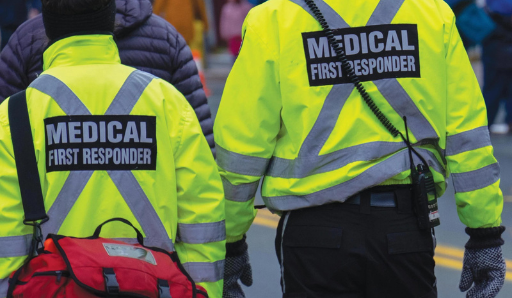Equipping Maine’s First Responders to Combat Compassion Fatigue
Maine Emergency Medical Services (EMS) are trained to respond to different types of service calls. They are often first on the scene of an overdose-related event. In just September 2023, EMS responded to 276 suspected opioid overdose-related calls. EMS clinicians want to be part of the answer and to help people in the communities they serve. Maine EMS noticed that some workers are experiencing compassion fatigue after facing many tough situations.
Compassion fatigue is a term that describes the physical or emotional impact of helping others- often through experiences of stress or trauma. It can happen when people who are always helping others start to feel worn out and find it hard to care as much as they used to.
This year, Maine Center for Disease Control and Prevention (Maine CDC) and Maine EMS built a pilot program to train and empower EMS Care Ambassadors to support and educate local EMS staff. The Ambassadors
had conversations about managing stress, reducing stigma, and providing resources to patients who use substances.
This program was made possible through Maine’s Project to Prevent Prescription Drug/Opioid OverdoseRelated Deaths grant awarded to Maine CDC from the federal Substance Abuse and Mental Health Services Administration. This program came during a time when Maine EMS was updating their standards of care, which requires EMS to offer patients and their loved ones naloxone after an overdose event.
“During one of my round table discussions with one local EMS agency we were able to talk about people who use substances,” stated Laura Hohenstein, Ambassador. “We came to an understanding that this patient population is like any other call we receive as first responders and many in the room were one or two degrees separated from someone who uses substances. There are a lot of misunderstandings about this population and together we were
able to work through these tough situations.”
Four Ambassadors were trained to provide outreach and education to local EMS agencies. Their outreach and round table discussions were recognized as successful from the feedback and shared experiences among peers.
“It was great to hear points of view and personal experiences of the local EMS providers,” shared Andrew Fournier, Ambassador. “Peers connecting with peers is a unique experience and not many other programs get this opportunity for connection. As EMS clinicians, we are all part of the solution to substance use in our community.”
The Ambassadors are making a real difference. From a dedicated 121 cold calls, they’ve visited many EMS teams, holding 15 roundtable conversations across the state.
“I wasn’t surprised about how open local agencies were to these roundtable discussions,” stated Sandy Staples, Ambassador. “Local EMS Providers truly care about the well-being of a community members, and they want to be part of helping those with substance use disorder. This was a great chance for local agencies to learn about services and resources offered and how EMS can use them to make a difference in their communities.”
After just 6 weeks, 19 departments decided to join the Naloxone leave-behind program. “It was important to discuss that people are more than just their substance use,” said Sandy Sikes, Ambassador. “There are many reasons people start to use substances and it is our job as first responders to help them through this difficult time by offering services and resources.”
Maine CDC and Maine EMS plan to continue these collaborative efforts as Maine EMS rolls out more substance use programming.
The future of the EMS Ambassador Cares Program is to continue providing peer-to-peer education for EMS staff by building from this year’s success and expanding the program to other areas of the state. The Maine EMS SUD Response Program team will bring on more Ambassadors in early 2024 to tackle new outreach efforts like the Overdose Prevention Through Intensive Outreach, Naloxone, and Safety (OPTIONS)Referral Pilot Program, and the upcoming Medicationfor Opioid Use Disorder Pilot Program. It is the goal of the program to continue to provide EMS with better tools to address substance use in their communities.
Jessica Schermer, MPH, is Program Manager for Maine’s Project to Prevent Prescription Drug Program at Maine CDC.




